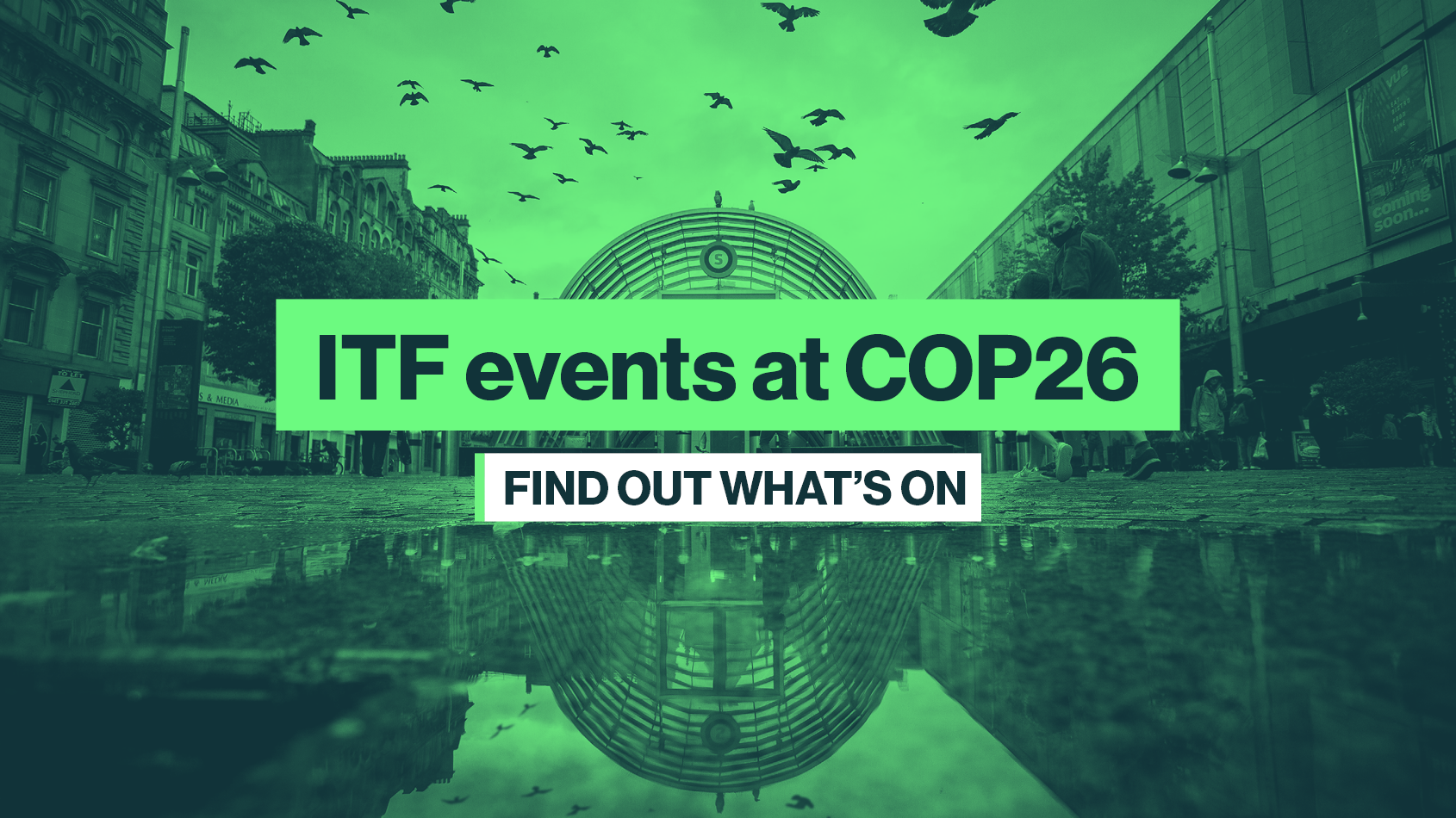
The COP26 Summit is underway in Glasgow and trade unionists and activists are in the thick of the proceedings.
This week is our opportunity to drive home the message that climate justice cannot exist without labour justice. To amplify the needs of workers, transport workers and union leaders from all sectors are sharing their views at a series of in-person and online ITF events from 6-10 November.
These events will cover urgent issues such as the importance of gender equality in decarbonisation, the future of zero-carbon shipping, and the urgent modal shift to public transport.
Don’t miss this important opportunity to set the agenda for the future of transport workers and our climate.
COP26 ITF Calendar of Events
You can participate in the events taking place that the International Transport Workers’ Federation and our affiliates will be representing transport workers at during COP26. We invite you to register to join any of these events virtually.
SATURDAY 6 NOVEMBER
Online event: Shaping the Future of Shipping - Ensuring a just transition for Shipping’s Future panel
Host: International Chamber of Shipping (ICS)
Time: 09:00 to 17:00 GMT
Who: ITF General Secretary, Stephen Cotton (on panel at 15:45-16:15 GMT)
Register here: bit.ly/cop26shipping
In-person events: Global Day of Action for Climate Justice
Find an action near you: bit.ly/jointheactionforclimate
MONDAY 8 NOVEMBER
Online event: The role of gender equality in decarbonising transport
Host: Official COP26 Green Zone event
Time: 16:00 to 17:30 GMT
Who: Sari Sairanen (UNIFOR), Young Tae Kim, Secretary-General of the International Transport Forum.
Watch here: bit.ly/cop26genderandtransport
TUESDAY 9 NOVEMBER
Online event: The revolution we need to decarbonise transport: transport workers in conversation
Host: ITF and People’s Summit for Climate Justice (COP26 Coalition)
Time: 11:45 GMT
Who: Q&A with workers from across transport chaired by ITF General Secretary Stephen Cotton
Register: bit.ly/cop26itffringe
WEDNESDAY 10 NOVEMBER
Online event: The future is public transport: Acting locally, acting globally for public investment.
Host: ITF and C40
Who: Mayors and trade union leaders from around the world, moderated by journalist Kamal Ahmed
Time: 11:45 to 13:15 GMT
Register: bit.ly/futureispublictransport
In-person event: 'Towards Net Zero' - Peace and Justice Project panel
Register: bit.ly/towardsnetzero
Online action: Demand better public transport demonstration
Register: bit.ly/demandpublictransport
Online event: Zero Carbon Transitions — Ambitions and Actions in the Transport sector
Register: bit.ly/zerocarbontransitions
The big picture: How did we get here?
Transport has been too cheap, for too long. Workers, their communities, and the environment have been paying the price. In reality, transport is a public good. It must meet the human needs of all groups of society, provide mobility for all, and make sure we get the goods we need.
Transport workers want to lead the transition we need to a sustainable future with a climate that's safe for us all.
ITF sustainable transport demands for COP26
Investing in sustainable transport can help us tackle the climate emergency by introducing new technologies and ways of working that produce fewer emissions into the atmosphere - all while creating millions of good jobs.
We believe the world needs a new transport model built on structural change towards decent, secure work. To do it, we need a worker-led just transition that retrains, reskills and redeploys today’s workers, and has big ambitions for the next generation of transport workers.
COP26 is our chance to fight for that future.That’s why we’re demanding the following from governments and employers:
- All transport carbon neutral by 2050 and public transport carbon neutral by 2030.
- Every country’s Nationally Determined Contributions (NDCs) include specific and ambitious sectoral targets for both passenger and freight transport.
- Workers participate in decision-making across the board, with real input into new health and safety rules, retraining programs, and sectoral decarbonisation plans.
- Public investment in and ownership of key transport infrastructure, including public transit like rail, buses and ferries, alongside industrial policy built for the 21st century.
- A green skills and jobs revolution that leaves no worker behind with retraining, upskilling, and new opportunities for all workers affected by the transition, especially women and young workers.


မွတ္ခ်က္အသစ္မ်ားတင္ျခင္း